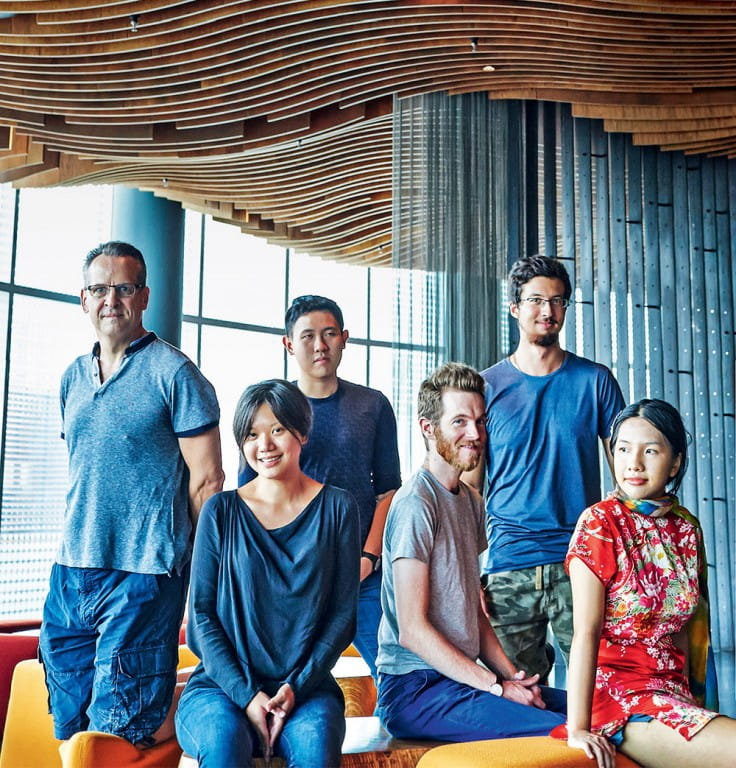Stories > Micro-Businesses With Big Aspirations
Micro-Businesses With Big Aspirations

Adrianna Tan (seated, fi rst from left) with the Wobe team in Singapore, comprising cofounders, advisors and interns.
Singaporean entrepreneur Adrianna Tan wants to help women in Indonesia run micro-businesses selling mobile phone credits.
BY DOUGLAS CHEW
PHOTO JUSTIN LOH
escribing herself as a “diehard feminist”, Adrianna Tan, 30, is making it her life’s mission to build movements that help improve women’s outcomes. Her latest venture is Wobe, short for women’s benefit, which would empower anyone with a smartphone in Indonesia to start a micro-business selling prepaid phone credits and, in future, other digital goods.
In 2014, Tan partnered with Indonesian telco Indosat Ooredoo to launch Wobe, allowing Indonesian women to benefit from the increased use of mobile phones and data in the country. Wobe’s basic idea is simple: Its clients sell prepaid phone credits, taking a cut of each transaction, as does Wobe, resulting in a self-sustaining business.
“The real measure of success will be how many jobs we can create for Indonesian women in our target group, and how many Wobe customers can directly benefi t from an increase in income. We aim to not only make money, but also to play a substantial role in the development of women in Indonesia.”
Adrianna Tan, Wobe founder
According to boutique advisory firm Redwing, which provides strategic advice to investors in the Indonesian tech industry, 98 per cent of mobile phone users in Indonesia utilise pre-paid services. “The volumes of phone transactions are high, the demand is inelastic, and there is already a practice of buying phone credits from your friends or the ‘canteen auntie’ (cafeteria staff) in schools and offices,” says Tan.
Although anyone in Indonesia can participate on Wobe’s platform, its target group is low-income women who have to take care of large families, often on their own. Based on its research, Tan estimates that nearly 15 per cent of all households in Indonesia are headed by single mothers who have little legal protection, social welfare or help. Says Tan: “Many such families run solely on the ingenuity and resourcefulness of the women who find themselves in impossible situations. They bear the double burden of looking after children while also providing for their families, and are unable to leave their homes for long periods even if they are able to find a well-paid job in the city.’’
CONNECTING LOCALLY
At the moment, Tan says Wobe is focused on Indonesia, so, to better connect with the local community, she has been taking intensive lessons in Bahasa Indonesia. To overcome challenges in setting up shop in Indonesia, she also collaborates with local partners.
She says: “I was lucky to have some good Indonesian friends from school who pitched in to help me find my feet. They showed me the ins and outs of doing business in Indonesia, and helped so much just by being my references here. Without them, it would take a much longer time...It’s a country where relationships matter, and some of those networks have helped.”
In May last year, Wobe participated in a 120-day start-up accelerator programme, organised by tech business incubator IdeaBox, to fine-tune its concept. The programme is powered by telco Indosat in partnership with asset management firm Mountain Partners AG and global telecom company Ooredoo. Wobe was also named Scale-Up of the Year for Asia last year by Unilever Foundry, a global platform to connect Unilever brands with innovative start-ups, providing the latter with chances to develop and work on global projects as well as access to mentors and funding opportunities.
Since then, Wobe has completed a small trial and is now poised to launch nationwide in Indonesia later this year. Wobe aims to garner 20,000 customers within its first year, at least half of them women. In the near future, it plans to offer financial literacy training through its online platform, events and partnerships.
Says Tan: “We’ve seen for ourselves how what we’ve built can contribute to greater financial independence among women. The very idea that they can earn some income on their own is empowering. It’s still early days... but my goal is to be able to work with lower income earners, the single mothers, and any woman in need.”
She believes a successful social venture needs to take care of its “double bottom line” of people and profits. She says: “Not many people or businesses are able to straddle both worlds.”
She hopes, of course, that Wobe will buck the trend. She says: “The real measure of success will be how many jobs we can create for Indonesian women in our target group, and how many Wobe customers can directly benefit from an increase in income. We aim to not only make money, but also to play a substantial role in the development of women in Indonesia.”
